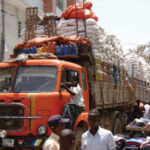Nigeria’s estimated national dog population – approximately 13 million – underscores the degree of canine presence in the country, hence the need for precaution.
Data from Lokoja through human-dog bite surveillance showed 95 bite cases, with 81% of victims being children under 10 years.
A survey in Kwara State revealed that 13% of respondents (193 out of 1,460 households) experienced dog bites, and, alarmingly, only 27% of those victims received post-exposure prophylaxis (PEP) to prevent rabies.
In Ogoja, Cross River State, 183 dog bite cases were documented. Dog vaccination coverage in these cases was just 43.9%, a concerning figure below the accepted immunity level.
Globally, the World Health Organisation (WHO) estimates roughly 59,000 human rabies deaths per year, the majority resulting from dog bites in Africa.
Risks beyond the bite
Apart from physical injuries, dog bites can lead to internal tissue damage, infections from bacteria like Pasteurella and, most significantly, rabies.
In Ado-Ekiti, six of 84 children bitten by dogs died due to an absence of post-exposure prophylaxis (PEP) and late hospitalisation. At the University of Benin Teaching Hospital, nearly all victims of dog bites lacked prior rabies vaccinations, although 95.8% completed PEP treatment.
What to do immediately after a dog bite
A thorough rinse with salt water and application of honey and turmeric paste to cushion the effect works best as an on-the-spot remedy.
However, the safest first step in the event of a dog bite is immediate wound-washing. Flush the bite thoroughly with soap and clean running water for at least 15 minutes. This action alone can reduce the risk of rabies transmission by up to 80%.
After cleansing, cover the wound lightly with a clean cloth and proceed to a health facility as quickly as possible. Medical personnel would typically recommend post-exposure prophylaxis (PEP), which involves a series of vaccines against rabies.
Preventive behaviour
The best defence against dog bites is prevention. If you encounter a dog, stay calm and avoid running, as dogs instinctively pursue moving objects.
Stand akimbo, avoiding eye contact. Allow the dog to sniff you if it approaches, and slowly back away without turning your back. Teach children to “be a tree” quiet and motionless, to reduce the risk of bites. Never disturb dogs while eating, sleeping, or caring for puppies to avoid defensive reactions.
In some cases, picking up a stone, or pretending to, is a helpful deterrent. Dogs may interpret it as a warning sign for chase and retreat.
While this can stop an advancing dog, some dogs may perceive the gesture as aggressive and respond with increased defensiveness or attack. Therefore, this should only be used if the dog attempts to attack, not merely bark.
Institutions leading the fight
Nigeria is home to several organisations tackling dog bites and rabies prevention.
The National Veterinary Research Institute (NVRI) plays a critical role in rabies study, vaccine development, and animal disease research.
The Global Alliance for Rabies Control (GARC) advocates global coordination for rabies elimination through dog vaccination and the “One Health” initiative.
New Incentives (ABAE), on the other hand, promotes immunisation among infants and mothers, reducing related exposures and health hazards.
Dog bites affect not just individual health but also emotional and social well-being. Everyone should take precautions by vaccinating their dogs, vaccinating themselves and seeking advanced knowledge to achieve a rabies-free society.
Nigeria's dog population, estimated at 13 million, highlights the importance of addressing canine-related issues. Surveillance in Lokoja reports 95 dog bite cases, predominantly affecting children under 10. A Kwara State survey revealed that 13% of households experienced dog bites, with only 27% of victims receiving rabies prevention treatment (PEP). In Ogoja, Cross River State, 183 cases were recorded, but only 43.9% involved vaccinated dogs, falling short of the adequate immunity level. Globally, dog bites are responsible for approximately 59,000 rabies deaths annually, with Africa being a significant contributor.
Risks from dog bites extend beyond physical injuries, leading to infections and rabies. In Ado-Ekiti, lack of timely PEP resulted in deaths, while the University of Benin Teaching Hospital observed poor prior rabies vaccination among bite victims. Immediate wound washing with soap and water can significantly reduce rabies risk. Seeking medical assistance promptly for PEP is vital.
Preventive measures include staying calm when encountering dogs, avoiding confrontation, and teaching children to remain still. Organizations like Nigeria’s NVRI, the Global Alliance for Rabies Control, and New Incentives are actively working toward rabies prevention through education and vaccination programs. Addressing dog bites impacts both physical and emotional health, urging a collective effort towards a rabies-free society.






